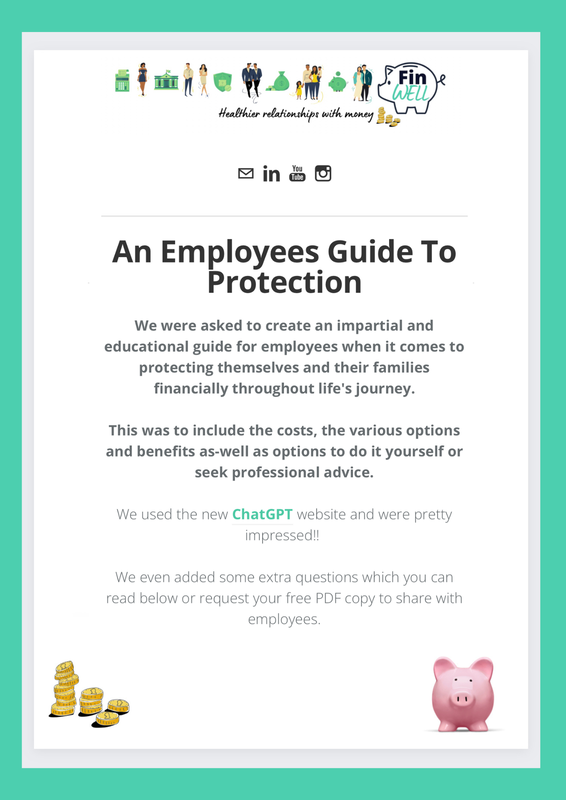An Employees Guide To Protection
|
We were asked to create an impartial and educational guide for employees when it comes to protecting themselves and their families financially throughout life's journey.
This was to include the costs, the various options and benefits as-well as options to do it yourself or seek professional advice. We used the new ChatGPT website and were pretty impressed!! We even added some extra questions which you can read below or request your free PDF copy to share with employees.
| |||
We asked: Provide a uk employees guide to financial protection along life's journey?
As a UK employee, there are several financial protections that you can consider throughout your life journey to safeguard your finances. Here's a guide to some of the essential financial protections that you should be aware of:
Overall, it's important to review your financial protection needs regularly, especially during significant life changes such as getting married, starting a family, or buying a house. Ensure you have appropriate coverage to protect your finances and your family's future.
As a UK employee, there are several financial protections that you can consider throughout your life journey to safeguard your finances. Here's a guide to some of the essential financial protections that you should be aware of:
- Pension Protection: One of the most crucial financial protections you can have is a pension plan. The UK government offers a state pension scheme, which you can claim when you reach the state pension age. However, it's advisable to consider additional pension schemes through your employer or private pensions to increase your income in retirement.
- Income Protection: Income protection insurance is designed to protect your income if you become unable to work due to illness or injury. It can provide you with a regular income for a specified period, allowing you to maintain your lifestyle and meet your financial obligations.
- Life Insurance: Life insurance pays out a lump sum to your family or dependents if you die. It can be a valuable financial protection if you have dependents who rely on your income.
- Critical Illness Cover: Critical illness cover provides a lump sum if you're diagnosed with a specified critical illness. This cover can help to pay for medical bills or other expenses during your recovery period.
- Private Medical Insurance: Private medical insurance can provide you with access to private healthcare facilities and treatments, giving you faster access to medical care than through the NHS.
- Home Insurance: Home insurance can protect your property against damage or loss due to theft, fire, or other hazards. It can also provide liability coverage in case someone is injured on your property.
- Travel Insurance: If you plan to travel, travel insurance can provide you with protection against medical emergencies, loss of luggage, trip cancellation, and other travel-related risks.
- Savings and Investments: Building up savings and investments can provide you with a financial cushion in case of emergencies and help you achieve your financial goals.
Overall, it's important to review your financial protection needs regularly, especially during significant life changes such as getting married, starting a family, or buying a house. Ensure you have appropriate coverage to protect your finances and your family's future.
We then asked: Give more information on the tax implications of payouts from insurance products?
It's worth noting that tax laws and regulations can change, and it's always advisable to consult a qualified tax advisor for specific advice on your individual circumstances.
Example of costs: The cost of insurance premiums for life insurance, critical illness cover, income protection, and private medical insurance can vary based on several factors such as age, health, lifestyle, and the level of cover you require. As an example, the average monthly cost for income protection insurance is around £50-60 per month, while the cost for private medical insurance can range from £30 to over £200 per month, depending on the level of cover and other factors.
- Life Insurance: The payout from a life insurance policy is usually tax-free in the UK. This means that the beneficiaries of the policy won't have to pay any tax on the money they receive.
- Critical Illness Cover: The payout from a critical illness policy is also usually tax-free. However, it's worth noting that the definition of a "critical illness" can vary between policies, and some conditions may not be covered.
- Income Protection: The payout from an income protection policy is taxable as income. This means that if you receive a payout from your policy, you'll need to pay income tax on the money you receive.
- Private Medical Insurance: The payout from private medical insurance isn't taxable in most cases, as it's considered a reimbursement of medical expenses rather than income.
It's worth noting that tax laws and regulations can change, and it's always advisable to consult a qualified tax advisor for specific advice on your individual circumstances.
Example of costs: The cost of insurance premiums for life insurance, critical illness cover, income protection, and private medical insurance can vary based on several factors such as age, health, lifestyle, and the level of cover you require. As an example, the average monthly cost for income protection insurance is around £50-60 per month, while the cost for private medical insurance can range from £30 to over £200 per month, depending on the level of cover and other factors.
We then asked: What are the options between doing it yourself and getting professional advice?
When it comes to financial protection, there are various options available, ranging from doing it yourself to seeking professional advice. Here are some of the options:
Ultimately, the option you choose will depend on your individual circumstances, financial knowledge, and personal preferences. It's important to ensure that you have adequate financial protection in place to safeguard your finances and your family's future. If you're unsure about which option to choose, seeking professional advice can be a good starting point. A financial advisor can help you to assess your financial situation and provide tailored recommendations that meet your individual needs.
When it comes to financial protection, there are various options available, ranging from doing it yourself to seeking professional advice. Here are some of the options:
- DIY: If you're confident in your financial knowledge and comfortable making your own financial decisions, you may choose to research and purchase financial protection products yourself. Many insurance companies offer online tools that can help you to compare and purchase policies.
- Financial Advisors: A financial advisor can provide you with professional advice on the most suitable financial protection products for your individual circumstances. They can assess your financial situation, help you to set financial goals, and provide tailored recommendations.
- Online Comparison Websites: There are many online comparison websites that can help you to compare different financial protection products and providers. These sites allow you to enter your details and requirements, and they will generate a list of products that meet your needs.
- Employer Benefits: Many employers offer financial protection benefits such as life insurance, income protection, and pensions as part of their employee benefits package. It's worth checking with your employer to see what benefits are available to you.
Ultimately, the option you choose will depend on your individual circumstances, financial knowledge, and personal preferences. It's important to ensure that you have adequate financial protection in place to safeguard your finances and your family's future. If you're unsure about which option to choose, seeking professional advice can be a good starting point. A financial advisor can help you to assess your financial situation and provide tailored recommendations that meet your individual needs.
We then asked: What’s the difference between financial education, guidance and advice?
Financial education, guidance, and advice are different forms of financial support, each with a specific purpose and level of detail.
In summary, financial education provides general information about personal finance, financial guidance provides recommendations, and financial advice provides tailored recommendations based on a person's specific financial situation.
Financial education, guidance, and advice are different forms of financial support, each with a specific purpose and level of detail.
- Financial education: Financial education refers to the process of learning about personal finance and financial management. It includes information about financial concepts, such as budgeting, saving, investing, and retirement planning, as well as practical tips and tools for managing money.
- Financial guidance: Financial guidance is a form of support that provides information and recommendations to help individuals make informed decisions about their finances. It is typically less specific and tailored to individual circumstances than financial advice.
- Financial advice: Financial advice is a more comprehensive form of support that is tailored to an individual's specific financial situation and goals. Financial advisors use their expertise to provide advice on financial products and strategies, such as investments, pensions, and insurance, and help individuals make informed decisions about their finances. Financial advice may come with fees.
In summary, financial education provides general information about personal finance, financial guidance provides recommendations, and financial advice provides tailored recommendations based on a person's specific financial situation.
FinWell offers financial wellbeing services through education, guidance, training and support.
No information or content shared on our website or in any workshop or 1-1 session should be taken as advice.
We can signpost to further resources and partnering organisations who offer professional advice or you can seek advice through other authorised and regulated companies and individuals.
FinWELL may receive a fee for services provided by our collaborative partner providers.
FINWELL TRAINING LTD
COMPANY NUMBER: 14126502
PRIVACY NOTICE
No information or content shared on our website or in any workshop or 1-1 session should be taken as advice.
We can signpost to further resources and partnering organisations who offer professional advice or you can seek advice through other authorised and regulated companies and individuals.
FinWELL may receive a fee for services provided by our collaborative partner providers.
FINWELL TRAINING LTD
COMPANY NUMBER: 14126502
PRIVACY NOTICE



